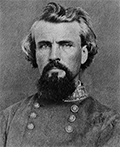Confederate General Nathan Bedford Forrest
Nathan Bedford Forrest was a Confederate general during the American Civil War. A highly successful cavalry commander, he was known as the "Wizard of the Saddle." 
He was born on July 13, 1821, in Chapel Hill, Tenn. His father, a blacksmith, died when Nathan was 16. He did not have the luxury of a normal education but excelled at outdoor skills like hunting and tracking. He worked for his uncle Jonathan, a tailor, for a time in Hernando, Miss. In 1845, he married Mary Anne Montgomery; they had two children. He moved his family to the Memphis area and proved to be a very successful businessman, making great wealth in the cotton and slave trades. He also dealt in real estate and owned a stagecoach company. When the Civil War began, Forrest volunteered for the Tennessee Mounted Rifles and spent a lot of money to pay and equip the other men in the unit. He gained a commission as lieutenant general. Forrest and his men were part of the Confederate defense of Fort Donelson. Rather than surrender to the victorious Union commander, Ulysses S. Grant, they melted into the snowy countryside and fought at the Battle of Shiloh just a few weeks later. A promotion to brigadier general followed. Forrest earned a reputation as a daring and very successful cavalry commander, conducting lightning raids on Union supply depots. His efforts helped prolong the Siege of Vicksburg. In one of his more inventive maneuvers, in May, he had engineered the surrender of a Union cavalry group by convincing its commander Col. Abel Streight that he was up against a much larger Confederate force by riding around the same hilltop several times. Forrest and his men also played a part in the Confederate victory at Chickamauga, dismounting and fighting alongside the infantry, and then, back on horseback, pursuing the retreating Union army to Chattanooga. At the end of 1863, he gained further promotion, to major general. Forrest and his men defeated a much larger Union force at the Battle of Okolona in February 1864 and then seized control of the Union-occupied Fort Pillow, near Memphis, on April 12. Having it surrounded, Forrest demanded that the Union commander surrender. He refused, and the Confederate troops took the fort. Among the Union soldiers who eventually surrendered were 262 members of the U.S. Colored Heavy Artillery. Some sources say that some of Forrest's men, enraged at seeing African-Americans in uniform and fighting for the uniform, executed them. The rules of warfare specifically prohibited such activity. Other sources report that Confederate soldiers asserted that the Union soldiers did not put down their weapons in surrender and, instead, fired on their attackers. 
One of Forrest's greatest triumphs came at Brice's Cross Roads, a few months after the capture of Fort Pillow. Outnumbered 2–, Forrest and his men nonetheless carried the day, after leading his opponents on a merry chase and then launching a surprise attack near Baldwyn, Miss. He was promoted yet again, to lieutenant general. In the waning months of the war, Forrest suffered rare defeats at the Battle of Tupelo in July 1864 and at Franklin and Murfreesboro. When Robert E. Lee surrendered to Grant at Appomattox, Forrest followed the lead of his top commander and surrendered as well, in May 1865. His last engagement had been a defeat, at the Battle of Selma. After the war, Forrest returned to Memphis and again found success in business, in the lumber and planting trades. He was at one time president of the Selma, Marion and Memphis Railroad. Many sources say that Forrest was involved in the formation of the white supremacist group the Ku Klux Klan and served as its highest officer, Grand Wizard. He denied any such association when he testified before a Joint Congressional Committee, in 1871. He suffered financial misfortune later in life and ended up overseeing a prison labor camp near Memphis. He died of diabetes on Oct. 29, 1877, in Memphis; he was 56. |
|
Social Studies for Kids
copyright 2002–2026
David White




